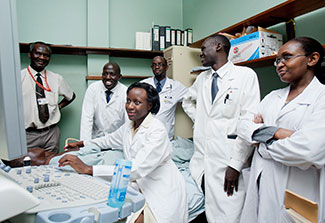African medical education program enters next phase
September / October 2016 | Volume 15, Number 5

Photo by Richard Lord for Fogarty
Fogarty is helping to plan the next phase of the Medical
Education Partnership Initiative (MEPI) to continue to
build health and science capacity in Africa.
Fogarty is working with its partners to plan how to build on the success of the
Medical Education Partnership Initiative (MEPI) and continue to strengthen and expand capacity building in sub-Saharan Africa. The Center has released two new program concepts that outline possible next steps.
The first would support a governing body to continue networking activities among health educators in Africa, including participants of MEPI and the related
NEPI network, devoted to nursing training. The second would fund efforts to strengthen training and retention of health care professionals; encourage research to improve and evaluate educational practices; and enhance capacity to develop, implement and evaluate evidence-based services with an emphasis on HIV/AIDS. Fogarty is working with the President’s Emergency Plan for AIDS Relief (PEPFAR) to develop these activities, which would be administered by NIH. Read the
funding concepts presented to the Fogarty Advisory Board.
During the August MEPI/NEPI meeting in Nairobi, health academics and professionals joined together to establish the African Forum for Research and Education in Health (AFREhealth). Building on the MEPI Principal Investigator Council, “AFREhealth will take the lead in driving solutions to African health challenges from an African perspective,” according to its chair, Dr. Peter Donkor, of Ghana’s Kwame Nkrumah University of Science and Technology. The new collective’s goals include sharing best practices, collaborating with stakeholders to improve health outcomes, mobilizing resources, working toward an AIDS-free generation, and establishing a research agenda for key health priorities.
More Information
To view Adobe PDF files,
download current, free accessible plug-ins from Adobe's website.